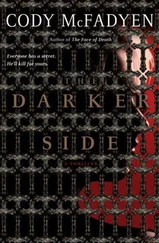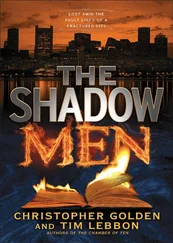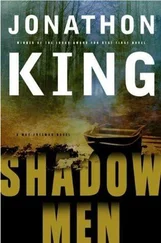"Most serial killers, we find, have similar histories. This usually involves abuse from a very young age. It could be physical, it could be sexual, often it is both. The result of this is rage, and it is a rage that they cannot express against their abuser, someone larger and stronger than they are, someone in a position of emotional trust and authority. The abuser is almost always a father or a mother. The abused loves this person and feels certain that the abuse must be justified. Caused by something they have done wrong.
"Rage must have an outlet. Without an immediate target, it is channeled by them, almost invariably in the same three ways. First, in violence against themselves: chronic bed-wetting. Then in violence against their environment: the setting of small fires. Finally, escalating in violence against living things: torturing and killing small animals. Once they are adults, this leads them to the logical conclusion: the infliction of harm against other human beings.
"All of this is, of course, an oversimplification. Human beings are not robots, and no one mind is the same as the other. Not all of them wet their beds, set fires, or kill small animals. The abuse is not always from a father, or a mother. But over time, the trends that we have found make this oversimplification more or less accurate."
He leans back, looking at me.
"There are exceptions. They are rare, but they do exist. They are the argument for those that feel nature is the explanation. Killers who came from decent homes and decent parents. Bad seeds. No apparent reason or explanation for what they do." He shakes his head. "Why does it have to be one or the other? I have always felt, and many agree, that it can be both. Nature and nurture. Of course, nurture, as I said, tends to be the most prevalent and observable cause." He taps on the report in front of him. "In this instance, the variables abound. He says he wasn't abused physically or sexually. That he didn't set fires or torture small animals. That may not be true. Perhaps he is in denial. But if he's not, then he is something new. He is a serial killer created from scratch. Someone who has been indoctrinated so heavily and for so long into a belief system that it has become a certainty for him. If that is true, he would be a very, very dangerous man. He won't have the injuries to the psyche caused by sexual or physical abuse. He won't have the low self-esteem these things cause.
"He would be able to operate at an extremely high level of rationality. He would have no difficulty assimilating himself into society. Indeed, he might have been trained to do just that.
"Jack Jr. would be doing what he does with the idea that it is his destiny. What he was born to do. He wouldn't consider it wrong. Because he has been told just the opposite from the moment he could understand the spoken word."
Dr. Child looks at me. "He has fixated on you because he needs this to complete the fantasy. He stated as much himself, that Jack the Ripper must be chased, preferably by a brilliant detective. He has chosen you for this. An astute choice."
He leans forward, tapping the report again. "The truth about the contents of the jar he sent you, the fact that they were bovine and not human, as he seems to think, this could be your most potent weapon. It is a symbol of everything he believes. He has always accepted it as truth. If he were to find out that this symbol is a lie, and always has been . . . it could shatter him. Could bring the world he's crafted tumbling down."
He leans back. "He has been very smart, very organized, very precise. If he were to find out about the jar--he could unravel. Of course, there is another possibility we can't ignore. That he would reject that truth out of hand. That he would decide it was a lie, designed to unsettle him. In such a scenario, he would blame the individual who had delivered this
'lie.' He would likely have an overwhelming urge to harm that individual. Both scenarios have their uses, yes?"
I nod. "They do."
"Be aware that each one contains possible dangers. If what he has built his life on is removed with such suddenness--he could become suicidal. In this case, however, I can almost guarantee you that he would not want to die alone."
I get the message. An enraged Jack Jr., devoid of hope, might well turn into a suicide bomber. Dr. Child is telling us to be prepared for this possibility.
"What about Ronnie Barnes?" I ask.
He nods, looking up at the ceiling. "Yes. The young man he claims to have found on the Internet and 'nurtured' himself. Very interesting--
though not entirely unprecedented. Killing in teams isn't as rare as people might think. Charles Manson may have led the most famous group of killers, but he was not the first or the last."
"Right," I reply. "I can think of twenty cases off the top of my head."
"More than that; but, yes, that's my point. An estimated fifteen percent of serial victims are the result of team killings. And while this one has a twist, it does fit the scenario. Teams generally consist of two individuals, but have numbered more. There is always a dominant figure, someone with a particular energy and a specific fantasy. He--or she--inspires the others, emboldens them to put the fantasy into action. All involved have psychopathic traits, but it's been thought in some instances--and I agree--that without that central figure, the others might never have taken that extra step to committing actual murder."
He smiles, and I get a glimpse of weary cynicism. "That's not to say that they were victims. It's not uncommon after arrest for the nondominants to claim that they were unwilling accomplices. But the evidence rarely bears this out."
"The Ripper Crew," I say.
Dr. Child smiles at me. "Excellent example. And a relatively recent one."
I was referring to the so-called Chicago Rippers of the 1980s. A psycho named Robin Gecht led a team of three other like-minded men. By the time they were caught, seventeen women or more had been raped, beaten, tortured, and strangled. Gecht's crew severed one or both breasts off their victims, which they used later for sexual purposes and . . . dining purposes.
"Gecht never personally killed anyone, did he?" I ask.
"No, he did not. But he was the driving force behind it all. Very charismatic man."
"Similar," I muse. "But not the same."
Dr. Child cocks his head, interested. "Explain."
"It's just a sense of him that I get. Sure, Jack Jr. is the dominant. He's calling the shots. But in most cases of team killings, there's an interpersonal relationship between the killers. They give each other something. They may be twisted, but they're a team . Jack sacrificed Barnes, and it was all to get to me and confuse us." I shake my head. "I think the followers are a calculated means to an end. I don't think he needs them, emotionally, for his fantasy."
Dr. Child steeples his fingers, considering this. He sighs. "Well, that would fit with his dual victimology."
"You mean his other victim type being us."
"Yes. It certainly makes him more dangerous. He's a 'man with a plan' as they say. Mr. Barnes--and any others--would in that scenario be pawns. Plastic pieces to move on a chessboard. Not the worst news, but not the best either. Less emotional involvement means less chance of him tripping himself up."
Great, I think.
"How would he go about finding potential teammates?" I ask. "In your opinion."
"Obviously, the Internet has provided him with both anonymity and access." Dr. Child looks almost wistful. "It's the continuing irony: worldchanging inventions, they can do great things or be used for great harm. On one hand, the Internet has broken down political boundaries. E-mails came out of Russia before the Iron Curtain fell. People from different places in the world can communicate in a heartbeat. Americans and Eskimos can find out that they aren't really so different from one another. On the other hand, it has provided an environment nearly free of constraint for the Jack Jr.'s of this world. Rape Web sites, pedophilia, sites devoted to displaying photographic grotesqueries such as execution victims or the bloody results of car crashes." He looks at me. "So, to answer your question, and based on the evidence he's provided thus far, he would look for converts by rooting around in the less-desirable areas of the Internet, specifically in areas where he could first observe. He'd need to be able to do nothing, in the beginning, but watch. He'd look for certain proclivities. Like all manipulators, he'd find key talking points, those things to ingratiate himself, to be authoritative about. However"--and he leans forward as he says this--"he would have to meet them face-to-face. Simple e-mail or chat rooms would not be sufficient. For various reasons. One would be simple security. It's far too easy to pretend an online identity. Our Jack is a risk taker, but he prepares before taking those risks. He'd want to ensure that the person he was talking to really was who and what they claimed to be."
Читать дальше












